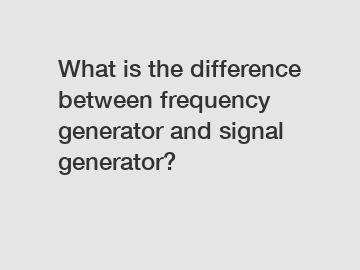What is the difference between frequency generator and signal generator?
What is the difference between frequency generator and signal generator? .
A frequency generator and a signal generator are two commonly used electronic instruments, but they serve different purposes. In short, a frequency generator is a specialized instrument used to generate a pure continuous waveform at a specific frequency, while a signal generator is a more versatile instrument that can generate a wide range of waveforms, including continuous waveforms, modulated waveforms, and arbitrary waveforms.
The difference between the two instruments stems from their intended applications and capabilities. Frequency generators are primarily used in specific applications where a stable and accurate source of continuous waveforms at a desired frequency is required. These applications include calibration of other instruments, testing and troubleshooting electronic circuits, and scientific research.

On the other hand, signal generators are designed to provide a broader range of waveforms and functionalities. They can generate not only continuous waveforms but also modulated waveforms, such as amplitude modulation (AM), frequency modulation (FM), and phase modulation (PM). Furthermore, signal generators often come with additional features like frequency sweep, burst mode, and modulation capabilities. These added functionalities make signal generators more suitable for a variety of applications, including communication system testing, audio signal generation, and electronic system design.
The difference in capabilities between frequency generators and signal generators is primarily due to their internal architecture. Frequency generators typically consist of a crystal oscillator that produces a highly stable signal at a fixed frequency. This signal is then amplified and shaped to produce a continuous waveform with minimal distortion. The focus on stability and accuracy allows frequency generators to achieve excellent frequency precision and low phase noise.
Signal generators, on the other hand, employ more complex circuitry to generate a wide range of waveforms. They often include a frequency synthesizer that allows for precise frequency control, modulation circuitry for generating modulated waveforms, and waveform memory for generating arbitrary waveforms. The additional circuitry in signal generators introduces more complexity and compromises the signal quality to some extent compared to frequency generators.
In conclusion, while both frequency generators and signal generators are essential tools in the field of electronics, they have distinct differences in terms of their intended applications and capabilities. Frequency generators excel at providing stable and accurate continuous waveforms at a specific frequency, while signal generators offer a broader range of waveforms and functionalities. Understanding these differences allows engineers and researchers to choose the appropriate instrument for their specific needs, ensuring the success of their projects.
Want more information on Types Of Signal Generator, How Does A Frequency Counter Work, Voltage Crest Factor? Feel free to contact us.

Comments